Chronic Illness: Self-Management, Depression, and Outcomes
VerifiedAdded on 2020/03/01
|6
|1494
|42
Discussion Board Post
AI Summary
This discussion post analyzes chronic illness from multiple perspectives. It begins by contrasting the healthcare system's approach to chronic versus acute conditions, highlighting the challenges of managing chronic diseases like COPD, diabetes, and depression. The post then distinguishes between 'disease' and 'illness,' emphasizing the patient's experience and response to their condition. Self-management is presented as a critical strategy, detailing how patients can actively participate in their care through lifestyle adjustments, medication management, and symptom monitoring. The discussion also covers the impact of depression as a comorbidity and explores outcome research to assess the effectiveness of healthcare interventions, concluding with a review of the Chronic Care Model and its components in providing patients with the skills to manage their diseases effectively. The discussion emphasizes the importance of integrating patient perspectives, beliefs, and values into the treatment process for improved outcomes.

DISCUSSION
By
Student’s Name
Institution Affiliation
Date of Submission
By
Student’s Name
Institution Affiliation
Date of Submission
Paraphrase This Document
Need a fresh take? Get an instant paraphrase of this document with our AI Paraphraser
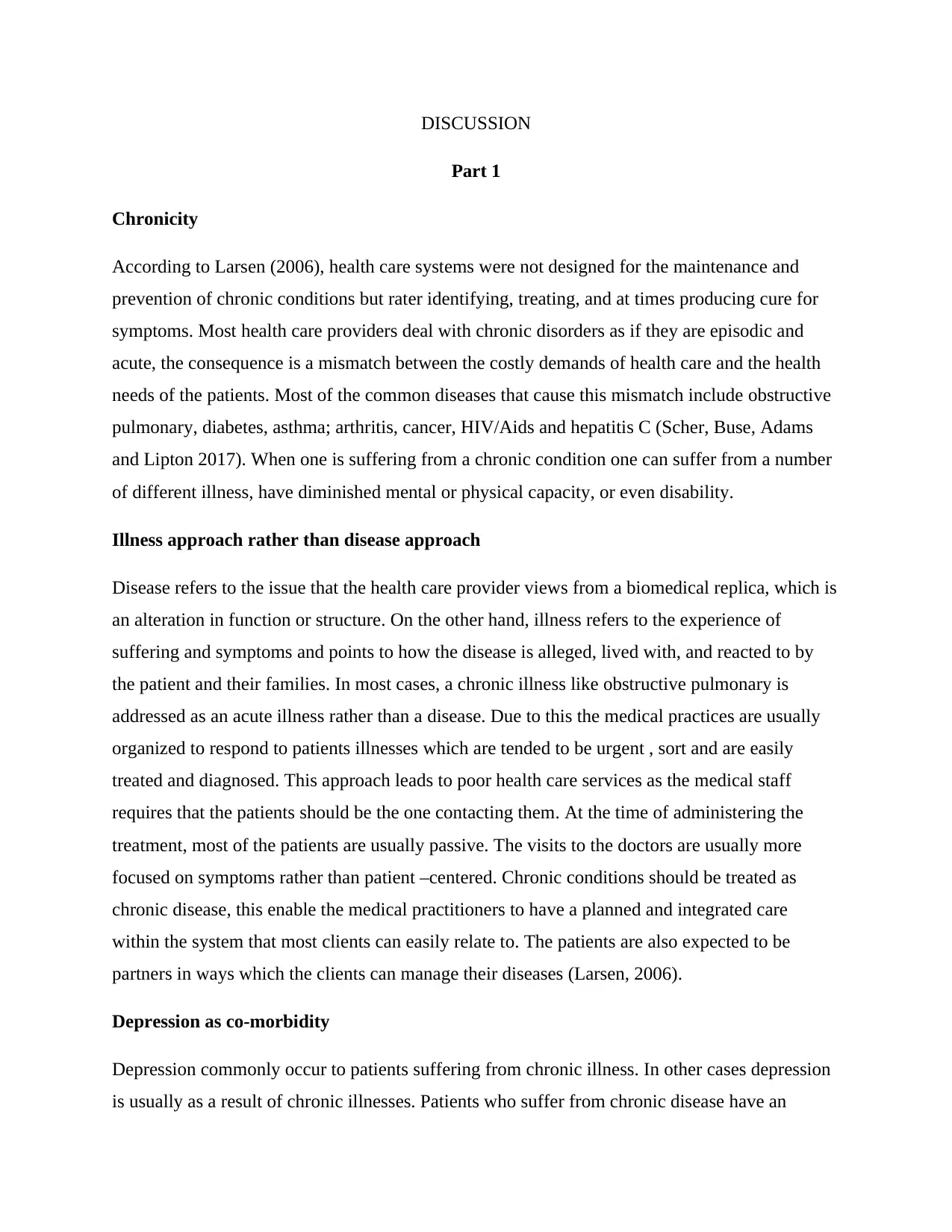
DISCUSSION
Part 1
Chronicity
According to Larsen (2006), health care systems were not designed for the maintenance and
prevention of chronic conditions but rater identifying, treating, and at times producing cure for
symptoms. Most health care providers deal with chronic disorders as if they are episodic and
acute, the consequence is a mismatch between the costly demands of health care and the health
needs of the patients. Most of the common diseases that cause this mismatch include obstructive
pulmonary, diabetes, asthma; arthritis, cancer, HIV/Aids and hepatitis C (Scher, Buse, Adams
and Lipton 2017). When one is suffering from a chronic condition one can suffer from a number
of different illness, have diminished mental or physical capacity, or even disability.
Illness approach rather than disease approach
Disease refers to the issue that the health care provider views from a biomedical replica, which is
an alteration in function or structure. On the other hand, illness refers to the experience of
suffering and symptoms and points to how the disease is alleged, lived with, and reacted to by
the patient and their families. In most cases, a chronic illness like obstructive pulmonary is
addressed as an acute illness rather than a disease. Due to this the medical practices are usually
organized to respond to patients illnesses which are tended to be urgent , sort and are easily
treated and diagnosed. This approach leads to poor health care services as the medical staff
requires that the patients should be the one contacting them. At the time of administering the
treatment, most of the patients are usually passive. The visits to the doctors are usually more
focused on symptoms rather than patient –centered. Chronic conditions should be treated as
chronic disease, this enable the medical practitioners to have a planned and integrated care
within the system that most clients can easily relate to. The patients are also expected to be
partners in ways which the clients can manage their diseases (Larsen, 2006).
Depression as co-morbidity
Depression commonly occur to patients suffering from chronic illness. In other cases depression
is usually as a result of chronic illnesses. Patients who suffer from chronic disease have an
Part 1
Chronicity
According to Larsen (2006), health care systems were not designed for the maintenance and
prevention of chronic conditions but rater identifying, treating, and at times producing cure for
symptoms. Most health care providers deal with chronic disorders as if they are episodic and
acute, the consequence is a mismatch between the costly demands of health care and the health
needs of the patients. Most of the common diseases that cause this mismatch include obstructive
pulmonary, diabetes, asthma; arthritis, cancer, HIV/Aids and hepatitis C (Scher, Buse, Adams
and Lipton 2017). When one is suffering from a chronic condition one can suffer from a number
of different illness, have diminished mental or physical capacity, or even disability.
Illness approach rather than disease approach
Disease refers to the issue that the health care provider views from a biomedical replica, which is
an alteration in function or structure. On the other hand, illness refers to the experience of
suffering and symptoms and points to how the disease is alleged, lived with, and reacted to by
the patient and their families. In most cases, a chronic illness like obstructive pulmonary is
addressed as an acute illness rather than a disease. Due to this the medical practices are usually
organized to respond to patients illnesses which are tended to be urgent , sort and are easily
treated and diagnosed. This approach leads to poor health care services as the medical staff
requires that the patients should be the one contacting them. At the time of administering the
treatment, most of the patients are usually passive. The visits to the doctors are usually more
focused on symptoms rather than patient –centered. Chronic conditions should be treated as
chronic disease, this enable the medical practitioners to have a planned and integrated care
within the system that most clients can easily relate to. The patients are also expected to be
partners in ways which the clients can manage their diseases (Larsen, 2006).
Depression as co-morbidity
Depression commonly occur to patients suffering from chronic illness. In other cases depression
is usually as a result of chronic illnesses. Patients who suffer from chronic disease have an
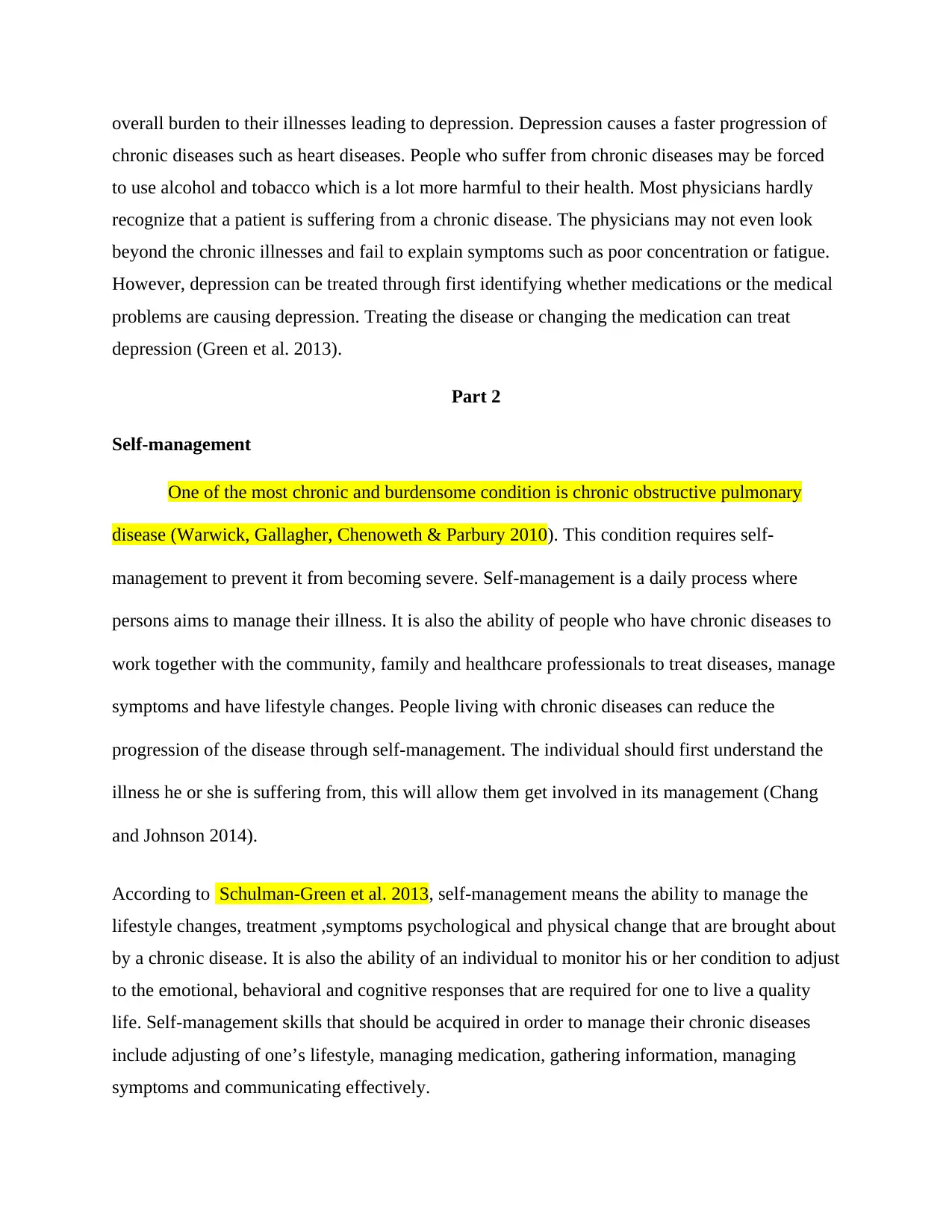
overall burden to their illnesses leading to depression. Depression causes a faster progression of
chronic diseases such as heart diseases. People who suffer from chronic diseases may be forced
to use alcohol and tobacco which is a lot more harmful to their health. Most physicians hardly
recognize that a patient is suffering from a chronic disease. The physicians may not even look
beyond the chronic illnesses and fail to explain symptoms such as poor concentration or fatigue.
However, depression can be treated through first identifying whether medications or the medical
problems are causing depression. Treating the disease or changing the medication can treat
depression (Green et al. 2013).
Part 2
Self-management
One of the most chronic and burdensome condition is chronic obstructive pulmonary
disease (Warwick, Gallagher, Chenoweth & Parbury 2010). This condition requires self-
management to prevent it from becoming severe. Self-management is a daily process where
persons aims to manage their illness. It is also the ability of people who have chronic diseases to
work together with the community, family and healthcare professionals to treat diseases, manage
symptoms and have lifestyle changes. People living with chronic diseases can reduce the
progression of the disease through self-management. The individual should first understand the
illness he or she is suffering from, this will allow them get involved in its management (Chang
and Johnson 2014).
According to Schulman-Green et al. 2013, self-management means the ability to manage the
lifestyle changes, treatment ,symptoms psychological and physical change that are brought about
by a chronic disease. It is also the ability of an individual to monitor his or her condition to adjust
to the emotional, behavioral and cognitive responses that are required for one to live a quality
life. Self-management skills that should be acquired in order to manage their chronic diseases
include adjusting of one’s lifestyle, managing medication, gathering information, managing
symptoms and communicating effectively.
chronic diseases such as heart diseases. People who suffer from chronic diseases may be forced
to use alcohol and tobacco which is a lot more harmful to their health. Most physicians hardly
recognize that a patient is suffering from a chronic disease. The physicians may not even look
beyond the chronic illnesses and fail to explain symptoms such as poor concentration or fatigue.
However, depression can be treated through first identifying whether medications or the medical
problems are causing depression. Treating the disease or changing the medication can treat
depression (Green et al. 2013).
Part 2
Self-management
One of the most chronic and burdensome condition is chronic obstructive pulmonary
disease (Warwick, Gallagher, Chenoweth & Parbury 2010). This condition requires self-
management to prevent it from becoming severe. Self-management is a daily process where
persons aims to manage their illness. It is also the ability of people who have chronic diseases to
work together with the community, family and healthcare professionals to treat diseases, manage
symptoms and have lifestyle changes. People living with chronic diseases can reduce the
progression of the disease through self-management. The individual should first understand the
illness he or she is suffering from, this will allow them get involved in its management (Chang
and Johnson 2014).
According to Schulman-Green et al. 2013, self-management means the ability to manage the
lifestyle changes, treatment ,symptoms psychological and physical change that are brought about
by a chronic disease. It is also the ability of an individual to monitor his or her condition to adjust
to the emotional, behavioral and cognitive responses that are required for one to live a quality
life. Self-management skills that should be acquired in order to manage their chronic diseases
include adjusting of one’s lifestyle, managing medication, gathering information, managing
symptoms and communicating effectively.
⊘ This is a preview!⊘
Do you want full access?
Subscribe today to unlock all pages.

Trusted by 1+ million students worldwide
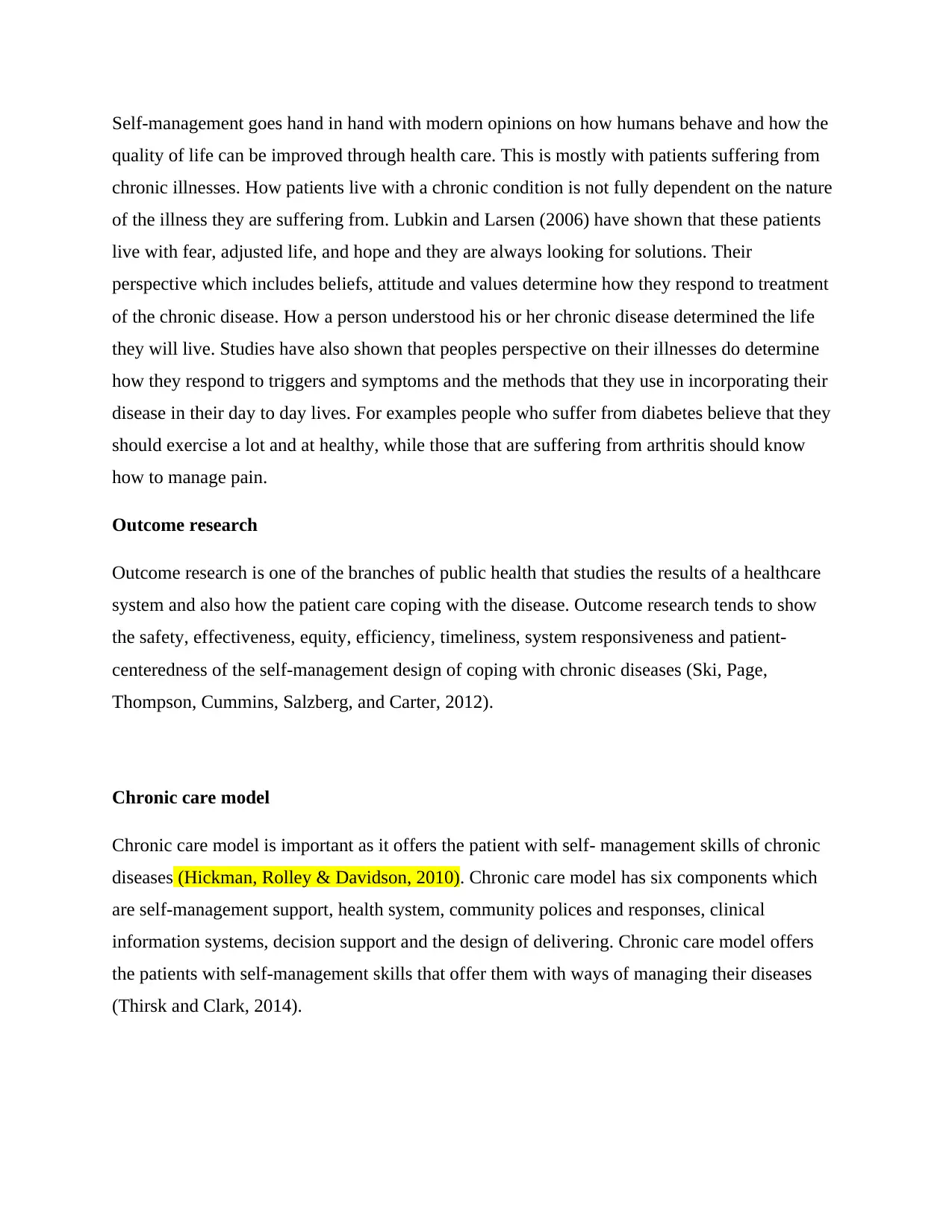
Self-management goes hand in hand with modern opinions on how humans behave and how the
quality of life can be improved through health care. This is mostly with patients suffering from
chronic illnesses. How patients live with a chronic condition is not fully dependent on the nature
of the illness they are suffering from. Lubkin and Larsen (2006) have shown that these patients
live with fear, adjusted life, and hope and they are always looking for solutions. Their
perspective which includes beliefs, attitude and values determine how they respond to treatment
of the chronic disease. How a person understood his or her chronic disease determined the life
they will live. Studies have also shown that peoples perspective on their illnesses do determine
how they respond to triggers and symptoms and the methods that they use in incorporating their
disease in their day to day lives. For examples people who suffer from diabetes believe that they
should exercise a lot and at healthy, while those that are suffering from arthritis should know
how to manage pain.
Outcome research
Outcome research is one of the branches of public health that studies the results of a healthcare
system and also how the patient care coping with the disease. Outcome research tends to show
the safety, effectiveness, equity, efficiency, timeliness, system responsiveness and patient-
centeredness of the self-management design of coping with chronic diseases (Ski, Page,
Thompson, Cummins, Salzberg, and Carter, 2012).
Chronic care model
Chronic care model is important as it offers the patient with self- management skills of chronic
diseases (Hickman, Rolley & Davidson, 2010). Chronic care model has six components which
are self-management support, health system, community polices and responses, clinical
information systems, decision support and the design of delivering. Chronic care model offers
the patients with self-management skills that offer them with ways of managing their diseases
(Thirsk and Clark, 2014).
quality of life can be improved through health care. This is mostly with patients suffering from
chronic illnesses. How patients live with a chronic condition is not fully dependent on the nature
of the illness they are suffering from. Lubkin and Larsen (2006) have shown that these patients
live with fear, adjusted life, and hope and they are always looking for solutions. Their
perspective which includes beliefs, attitude and values determine how they respond to treatment
of the chronic disease. How a person understood his or her chronic disease determined the life
they will live. Studies have also shown that peoples perspective on their illnesses do determine
how they respond to triggers and symptoms and the methods that they use in incorporating their
disease in their day to day lives. For examples people who suffer from diabetes believe that they
should exercise a lot and at healthy, while those that are suffering from arthritis should know
how to manage pain.
Outcome research
Outcome research is one of the branches of public health that studies the results of a healthcare
system and also how the patient care coping with the disease. Outcome research tends to show
the safety, effectiveness, equity, efficiency, timeliness, system responsiveness and patient-
centeredness of the self-management design of coping with chronic diseases (Ski, Page,
Thompson, Cummins, Salzberg, and Carter, 2012).
Chronic care model
Chronic care model is important as it offers the patient with self- management skills of chronic
diseases (Hickman, Rolley & Davidson, 2010). Chronic care model has six components which
are self-management support, health system, community polices and responses, clinical
information systems, decision support and the design of delivering. Chronic care model offers
the patients with self-management skills that offer them with ways of managing their diseases
(Thirsk and Clark, 2014).
Paraphrase This Document
Need a fresh take? Get an instant paraphrase of this document with our AI Paraphraser
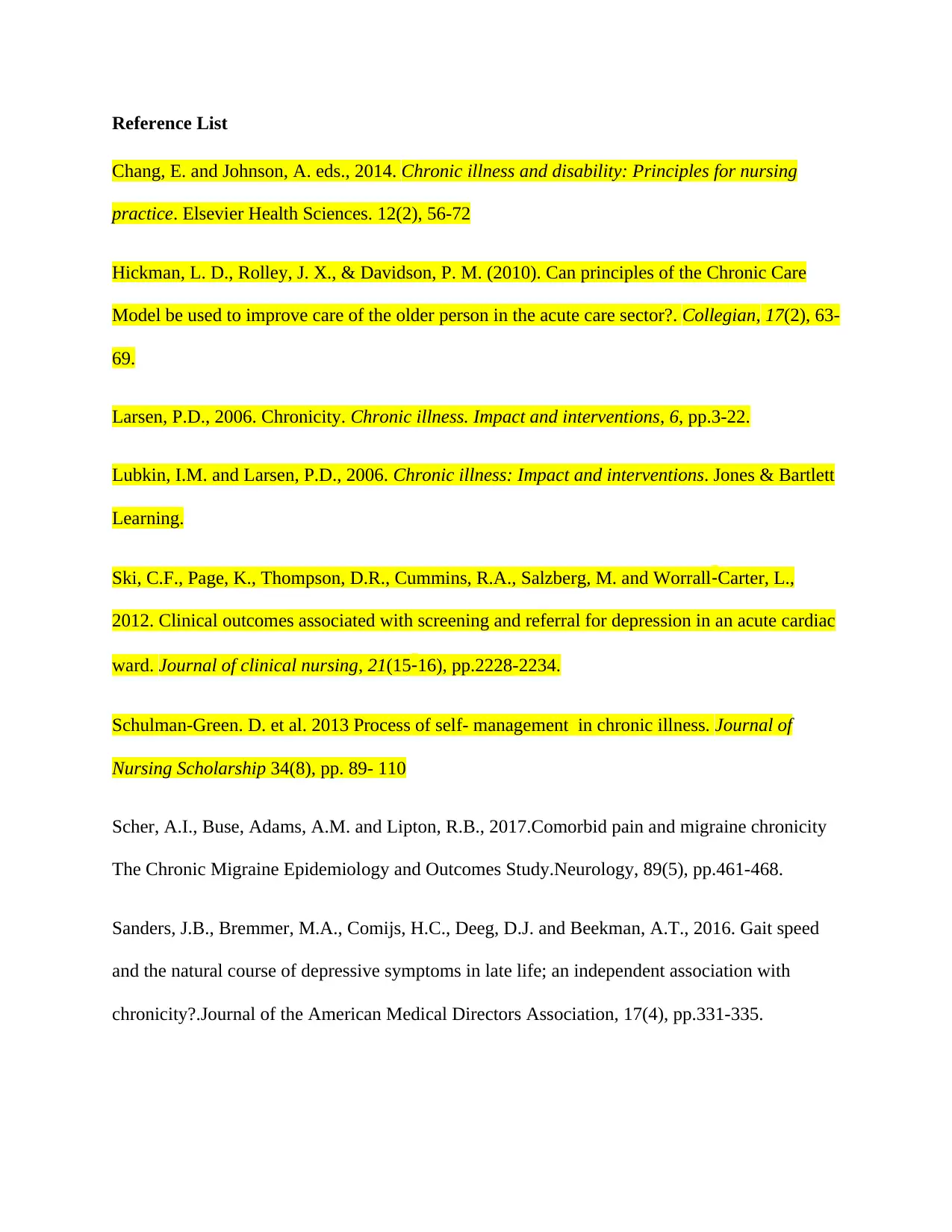
Reference List
Chang, E. and Johnson, A. eds., 2014. Chronic illness and disability: Principles for nursing
practice. Elsevier Health Sciences. 12(2), 56-72
Hickman, L. D., Rolley, J. X., & Davidson, P. M. (2010). Can principles of the Chronic Care
Model be used to improve care of the older person in the acute care sector?. Collegian, 17(2), 63-
69.
Larsen, P.D., 2006. Chronicity. Chronic illness. Impact and interventions, 6, pp.3-22.
Lubkin, I.M. and Larsen, P.D., 2006. Chronic illness: Impact and interventions. Jones & Bartlett
Learning.
Ski, C.F., Page, K., Thompson, D.R., Cummins, R.A., Salzberg, M. and Worrall‐Carter, L.,
2012. Clinical outcomes associated with screening and referral for depression in an acute cardiac
ward. Journal of clinical nursing, 21(15‐16), pp.2228-2234.
Schulman-Green. D. et al. 2013 Process of self- management in chronic illness. Journal of
Nursing Scholarship 34(8), pp. 89- 110
Scher, A.I., Buse, Adams, A.M. and Lipton, R.B., 2017.Comorbid pain and migraine chronicity
The Chronic Migraine Epidemiology and Outcomes Study.Neurology, 89(5), pp.461-468.
Sanders, J.B., Bremmer, M.A., Comijs, H.C., Deeg, D.J. and Beekman, A.T., 2016. Gait speed
and the natural course of depressive symptoms in late life; an independent association with
chronicity?.Journal of the American Medical Directors Association, 17(4), pp.331-335.
Chang, E. and Johnson, A. eds., 2014. Chronic illness and disability: Principles for nursing
practice. Elsevier Health Sciences. 12(2), 56-72
Hickman, L. D., Rolley, J. X., & Davidson, P. M. (2010). Can principles of the Chronic Care
Model be used to improve care of the older person in the acute care sector?. Collegian, 17(2), 63-
69.
Larsen, P.D., 2006. Chronicity. Chronic illness. Impact and interventions, 6, pp.3-22.
Lubkin, I.M. and Larsen, P.D., 2006. Chronic illness: Impact and interventions. Jones & Bartlett
Learning.
Ski, C.F., Page, K., Thompson, D.R., Cummins, R.A., Salzberg, M. and Worrall‐Carter, L.,
2012. Clinical outcomes associated with screening and referral for depression in an acute cardiac
ward. Journal of clinical nursing, 21(15‐16), pp.2228-2234.
Schulman-Green. D. et al. 2013 Process of self- management in chronic illness. Journal of
Nursing Scholarship 34(8), pp. 89- 110
Scher, A.I., Buse, Adams, A.M. and Lipton, R.B., 2017.Comorbid pain and migraine chronicity
The Chronic Migraine Epidemiology and Outcomes Study.Neurology, 89(5), pp.461-468.
Sanders, J.B., Bremmer, M.A., Comijs, H.C., Deeg, D.J. and Beekman, A.T., 2016. Gait speed
and the natural course of depressive symptoms in late life; an independent association with
chronicity?.Journal of the American Medical Directors Association, 17(4), pp.331-335.
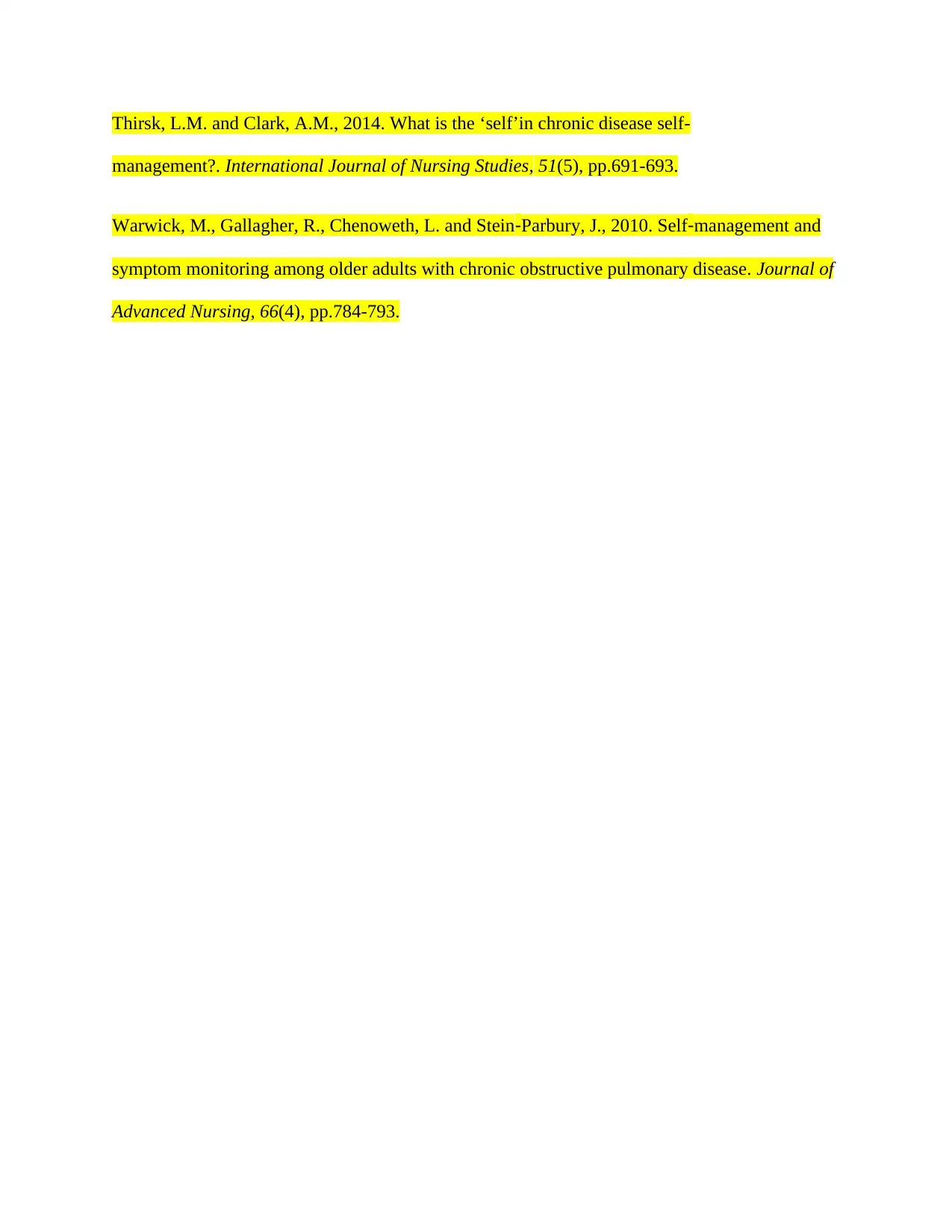
Thirsk, L.M. and Clark, A.M., 2014. What is the ‘self’in chronic disease self-
management?. International Journal of Nursing Studies, 51(5), pp.691-693.
Warwick, M., Gallagher, R., Chenoweth, L. and Stein‐Parbury, J., 2010. Self‐management and
symptom monitoring among older adults with chronic obstructive pulmonary disease. Journal of
Advanced Nursing, 66(4), pp.784-793.
management?. International Journal of Nursing Studies, 51(5), pp.691-693.
Warwick, M., Gallagher, R., Chenoweth, L. and Stein‐Parbury, J., 2010. Self‐management and
symptom monitoring among older adults with chronic obstructive pulmonary disease. Journal of
Advanced Nursing, 66(4), pp.784-793.
⊘ This is a preview!⊘
Do you want full access?
Subscribe today to unlock all pages.

Trusted by 1+ million students worldwide
1 out of 6
Related Documents
Your All-in-One AI-Powered Toolkit for Academic Success.
+13062052269
info@desklib.com
Available 24*7 on WhatsApp / Email
![[object Object]](/_next/static/media/star-bottom.7253800d.svg)
Unlock your academic potential
Copyright © 2020–2026 A2Z Services. All Rights Reserved. Developed and managed by ZUCOL.





